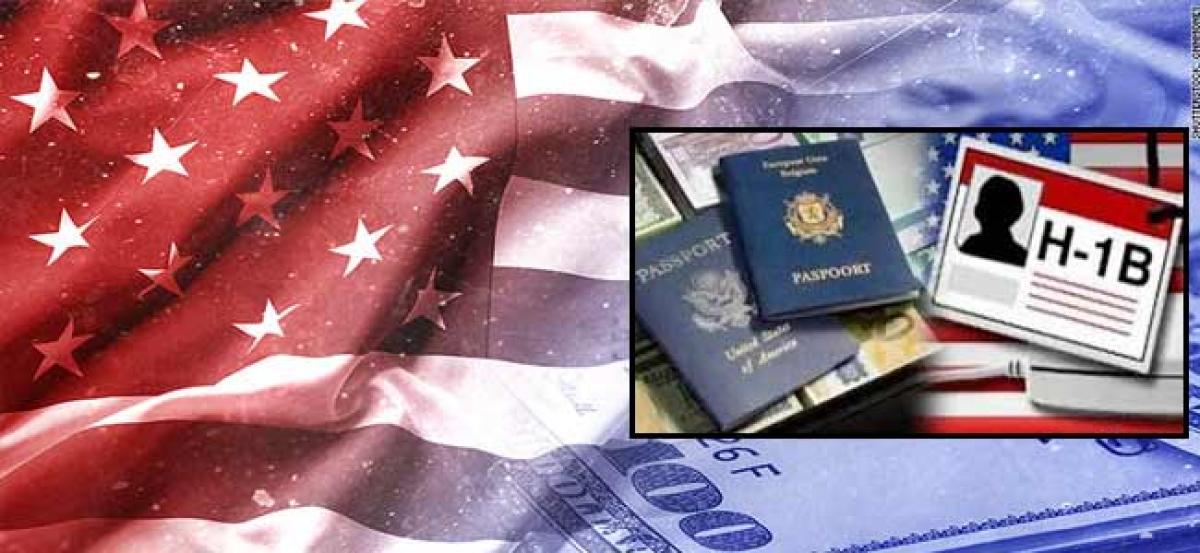Live
- Biden Pardon: Joe Biden Commutes Death Sentences of 37 Inmates, Including Child Killers and Mass Murderers
- South Korea: Yoon believes impeachment trial takes priority over martial law probe
- Strict Action for Non-Adherence to Time Management - DMHO Dr. Swarajya Lakshmi
- Over 13.29 lakh houses approved for rural poor in Maharashtra: Shivraj Chouhan
- District Collector Urges Timely Completion of Indiramma Housing Scheme Survey
- Digital Arrest Scam: Hyderabad Man Duped of ₹7 Lakhs by Fake Crime Branch Police Callers
- Sukhbir Badal seeks President's Police medal for officer who saved his life
- US Firm Accordion Acquires Merilytics, Launches 1,500-Seater Office in Hyderabad
- Free Medical Camp Organized by Alampur Advocate Bar Association
- Allu Arjun Receives Notices from Police for Further Inquiry
Just In
The new US deportation policy gives H-1B visa holders a temporary recess


The new policy of the US Citizenship and Immigration Services USCIS sanctions officials to start deportation litigations against individuals whose applications for visa extensionsay, from tourist to student have been denied and who are not in a period of authorised stay at the time of the denial
NEW DELHI: The new policy of the US Citizenship and Immigration Services (USCIS) sanctions officials to start deportation litigations against individuals whose applications for visa extension(say, from tourist to student) have been denied and who are not in a period of authorised stay at the time of the denial.“The policy will not be implemented with respect to employment-based petitions and humanitarian applications and petitions, at this time,” said a USCIS statement.
The Indian community in the US, H-1B visa holders are not covered for currently, by the deportation norms coming into force from October 1.
Later on Wednesday, the USCIS announced that the NTA policy will apply, at least initially, to solicitation made for change of status to green cards while the applicant is in the US (Form I-485 applications) and also visa extension requests (Form I-539 applications), accepting employment visa extensions. Therefore, the new policy will cover international students and tourists to extend their visa status.
Immigration promoter feels the new announcement positions to implement the NTA policy in a more accurate manner, with adequate warning to leave the country, which was missing in the June 28 policy contract.
“The USCIS has stated that in cases where someone falls out of status because of a denial of their application (say for a visa extension), they will be sent a letter informing them of the necessity to leave the US. Suppose one applies for extension of their tourist visa. If in response to a direction to leave, the person overstays, the USCIS may institute deportation proceedings,” explained Rajiv S Khanna, managing attorney at Immigration.com.
Form I-539 application has to be categorised by international students who expect to extend their stay in the US. Those wanting to change their status also have to file it. Many aspiring students travel on visitor visas (B2 visa) to travel and then decide upon a course of study, at which time they apply to change the status to F (student visa).“A visitor visa is valid for six months. The I-539 processing times are upwards of six months, so what will inevitably happen is even if the I-539 is approved, the period of authorised stay will have expired. In reality, foreign nationals may have to leave within six months instead of extending or changing status in the US,” Snehal Batra, managing attorney at NPZ Law told media.
“The USCIS has stated that in cases where someone falls out of status because of a denial of their application (say for a visa extension), they will be sent a letter informing them of the necessity to leave the US. Suppose one applies for extension of their tourist visa. If in response to a direction to leave, the person overstays, the USCIS may institute deportation proceedings,” explained Rajiv S Khanna, managing attorney at Immigration.com.
Currently, H-1B visa holders are respiting a sigh of relief. “As the USCIS has suspended premium processing of H-1B applications up to February 19, the policy memorandum had made the expat community jittery. Most employees continue to work in the US during the 240-day grace period, pending visa extension approval. Prior to this carveout announcement by USCIS, rejection of an application for H-1B visa extension received during the grace period would have resulted in commencement of deportation proceedings. A huge worry has been lifted with the recent announcement,” said an in-house immigration counsel at a large technology company.
Often employees continue to work in the US during the 240-day grace period, pending visa extension approval.
Cyrus Mehta, immigration attorney in New York says: “What is clear is that if an H-1B extension gets denied, the applicant will not receive a NTA at this time. Thus, I doubt the H-4 dependant who filed the I-539 extension application will receive a NTA if the H-1B does not. However, we need to wait for further clarification from the USCIS.”For H-1B holders applying for green cards, Batra has a word of caution. “One takeaway is to be sure you are continuing to maintain your underlining non-immigrant visa (say H-1B) while you are processing your I-485. You should continue to extend your H-1B visa, even while your I-485 is pending. This way, if your green card application is denied, you are still in a period of authorised stay’’, she said.

© 2024 Hyderabad Media House Limited/The Hans India. All rights reserved. Powered by hocalwire.com






